Fluffy and colorful and soaked in a delicious orange scented syrup! A mouthwatering Greek Orange cake (Portokalopita) with the aromas and blends of fresh oranges and cinnamon.
This is my ultimate cake which always surprises my guests when I tell them that it actually has no flour in it! Intrigued? Go ahead and discover what is portokalopita (orange syrup cake), how to make it the traditional way with my tips and tricks, how to store it, what to serve it with and of course my recipe!
What is Portokalopita?
The name Portokalopita is a Greek compound word formed from the roots “portokáli,” which means oranges, and “pita,” which refers to pastry. Why? Because this cake is made using phyllo pastry sheets! Even its Greek name literally translates to greek orange pie!
There is a saying that this Greek cake originated as a means to utilise the remaining dried up phyllo flakes that were left over when making traditional greek pies, like cheese pie and spinach pie. Which I must say is ingenious! It’s kind of like recycling but much tastier!
What you’ll need to make Greek Orange Cake the traditional way
Most of the ingredients in this traditional Greek orange cake are fairly standard and most likely are already in your cupboard. The key ingredients that make all the difference in this recipe are:
- Yoghurt: Aim for the 2% variety so the cake is not too rich as we will also be adding oil to the mix
- Vegetable oil: Any light vegetable oil would be great for this recipe, such as sunflower oil.
- Oranges: Get some large, mature oranges, so you get plenty of flavour and juice out of them. You can also add some store bought orange juice to the mix if your oranges don’t have as much juice in them.
- Phyllo sheets: You’ll need about 2 packets worth of phyllo sheets from your local supermarket. Try to get the more delicate phyllo sheets if you have the option, as we will be crumbling them up to fine flakes. How? Check how many sheets are in the pack and how much the pack weighs. Get the pack with the most sheets for the least weight!
Preparing the phyllo for your Portokalopita
As the traditional portokalopita has no flour, it is very important that the phyllo sheets are prepared correctly – they act as the flour in your cake! So how to prepare them the traditional way?
Firstly, make sure your portocalopita phyllo sheets are completely dry. When preparing your orange syrup cake, the first thing to do is to take the phyllo sheets out of their wrap, crinkle them a bit with your hands and spread them over your work surface and let them stand for about 20 minutes until completely dry.
Alternatively, if you are short on time, crinkle the phyllo up and place it on baking trays and pop them in the oven at 100C/200F to dry. You’ll need to do multiple batches, so when the first batch is ready take them out, crumble them by hand and then repeat until all your portokalopita phyllo is dry.
Greek Orange Pie Preparation Steps
To prepare your greek orange pie start by making the syrup. Bring a pot of water, sugar, orange zest and a cinnamon stick to a boil. Simmer for 5-10 minutes, until the sugar is completely dissolved and the syrup has thickened. Allow to cool before using.
Meanwhile, prepare the orange cake mix. In a large mixing dish, combine the vegetable oil, sugar, and eggs and whisk until combined.
Take the orange zest, yogurt, orange juice and vanilla extract. Combine all of the ingredients in a medium-size mixing bowl with a whisk. Add the baking powder in small batches before adding to avoid clumping together.
Using your hands, crumble the phyllo into tiny pieces. Add them carefully while whisking so that they don’t clump together.
Get a baking tray approx. 20x30cm / 8×12 inch in size, oil the bottom and sides, then add the mixture. Bake for 40-50 minutes at 180C/350F until golden brown and cooked throughout. Test for doneness by piercing a hole with a knife; if the knife comes out clean, the greek orange pie is cooked.
To finish the orange cake, pour slowly over the hot cake the cold syrup. Allow each spoonful of syrup to be absorbed before adding another. Allow for the syrup to be absorbed before chilling. This Greek orange cake is best served cold, not hot so it won’t break apart when cutting it and serving it.
Making ahead of time and storing
This Greek orange phyllo cake is ideal for making ahead of time! It must stay in the fridge for a while before the syrup can fully settle into the cake base, so it’s best to make it the day before you plan to serve it.
This orange syrup cake can be served cold, which I prefer, or at reheated to be lukewarm. To warm it up, serve a slice on a plate and pop it in the microwave for 30 seconds to take the chill off. Experiment with what you prefer and let me know in the comments below!
You can store your leftovers in the refrigerator for up to 5 days. This cake is not intended to be frozen as the phyllo sheets become soggy and will loose their delicious texture and flavor.
Serving suggestions
To add a touch of class, top the cake with thinly sliced oranges before baking. Before serving, you can drizzle your slices with chocolate syrup which goes amazingly well with the orange flavour of this cake! On a summer day, add a scoop of ice cream on top or some Greek yogurt on the side when you serve it, particularly if it’s hot outside!
Love orangey desserts?
If you love orange scented desserts as much as I do, these recipes are made for you!
Love syrupy desserts?
If you love a traditional syrupy greek desert, the below recipes are made for you! Enjoy!
- Baklava Cheesecake
- Chocolate Baklava
- Traditional Greek Baklava Recipe with Walnuts and Honey
- Greek baklava rolls recipe (Saragli)
- Chocolate Souffle in Baklava Pouches recipe
- Galaktoboureko with Kataifi (Greek Custard and shredded phyllo pie)
- Homemade Kataifi recipe
- Greek Ekmek Kataifi recipe (Custard and whipped cream pastry with syrup)
- Karidopita/Karithopita recipe (Greek Walnut Cake with Syrup)
- Greek Ravani / Revani recipe (Coconut cake with syrup)
- Traditional Greek Galaktoboureko recipe (Greek Custard Pie with Syrup)
- Loukoumades recipe (Greek Donuts with Honey and Walnuts)
- Samali – Semolina cake with mastic syrup
Oh and you can always read this delicious recipe in Greek here: Πορτοκαλόπιτα συνταγή με φύλλο κρούστας.
Print
Traditional Greek Orange Cake with Syrup (Portokalopita)
- Prep Time: 20 min
- Cook Time: 50 min
- Total Time: 1 hour 10 minutes
- Yield: 10 pieces 1x
- Category: Dessert
- Method: Baked
- Cuisine: Greek
Description
Looking for a traditional Greek Orange cake recipe? Discover the secrets behind making this extra syrupy Portokalopita infused with the aromas of oranges and cinnamon.
Ingredients
For the Portokalopita
- 200g yogurt (2% fat) (7 ounces)
- 300 ml vegetable oil (1 and 1/4 of a cup)
- 300 ml sugar (1 and 1/4 of a cup)
- 300ml orange juice ( 1 and 1/4 of a cup)
- 20g baking powder (4 tsps)
- zest of 1 1/2 orange
- 1 tsp vanilla extract
- 440–450g phyllo dough (15 ounces)
- 4 medium sized eggs
For the syrup
- 400ml water (1 and 2/3 of a cup)
- 400ml sugar (1 and 2/3 of a cup)
- zest of 1 orange
- 1 cinnamon stick (optional)
Instructions
- Unwrap the phyllo dough from the plastic sleeve; place the sheets on a large surface and leave at room temperature for 20 minutes, in order to dry well. Alternatively, spread a few on a large baking tray and bake at 100C/200F, until dry; repeat with the rest.
- To prepare this Greek orange cake, start first by preparing the syrup. Pour into a pot the water, the sugar, the orange zest and a cinammon stick and bring to the boil. Simmer for 5-10 minutes, until the sugar is dissolved and the syrup has thickened. Set aside to cool.
- In the meantime prepare the mixture for the orange cake. Pour the vegetable oil into a large bowl, add the sugar and the eggs and whisk. Add the yogurt, the orange juice, the orange zest and the vanilla extract and whisk well, until the ingredients combine and the mixture is smooth. Add the baking powder, and whisk lightly.
- Crumble the phyllo into small pieces using your hands. Add them gradually into the mixture while whisking so they don’t stick to each other.
- Using a cooking brush, oil the bottom and the sides of a baking tray (approx.20x30cm / 8×12 inch) and pour in the mixture. Bake in preheated oven at 180C/350F for 40-50 minutes until, nicely coloured and cooked through. Check if it is ready, by poking a hole with a knife. If the knife comes out clean, then the cake is ready.
- To finish the orange cake, ladle slowly the cold syrup over the hot cake. Allow each ladle of syrup to be absorbed, before ladling again.
- Allow time for the syrup to be absorbed and put in the refrigerator. Greek orange cake is ideally served cold, not hot, so that it does not crumble. Enjoy with a big spoonful of ice cream!
Nutrition
- Serving Size: 1 piece
- Calories: 644kcal
- Sugar: 62.5g
- Sodium: 215.5mg
- Fat: 32g
- Saturated Fat: 5.2g
- Unsaturated Fat: 25.3g
- Trans Fat: 0g
- Carbohydrates: 86.7g
- Fiber: 1g
- Protein: 5.1g
- Cholesterol: 2.6mg

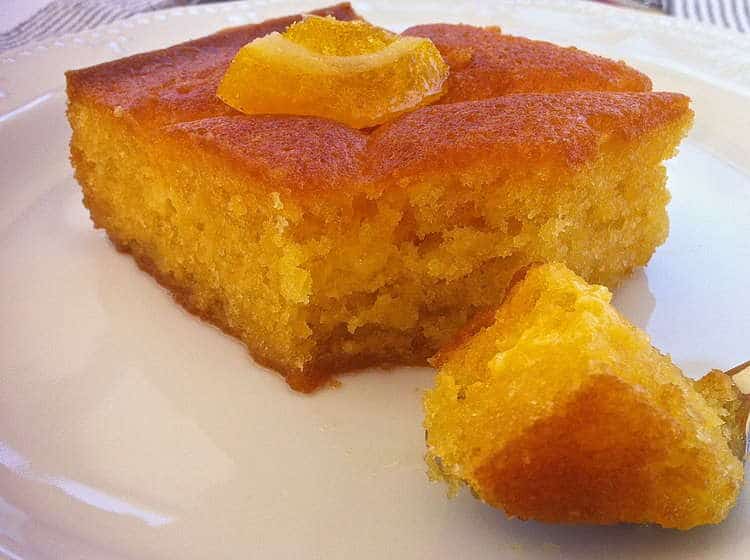


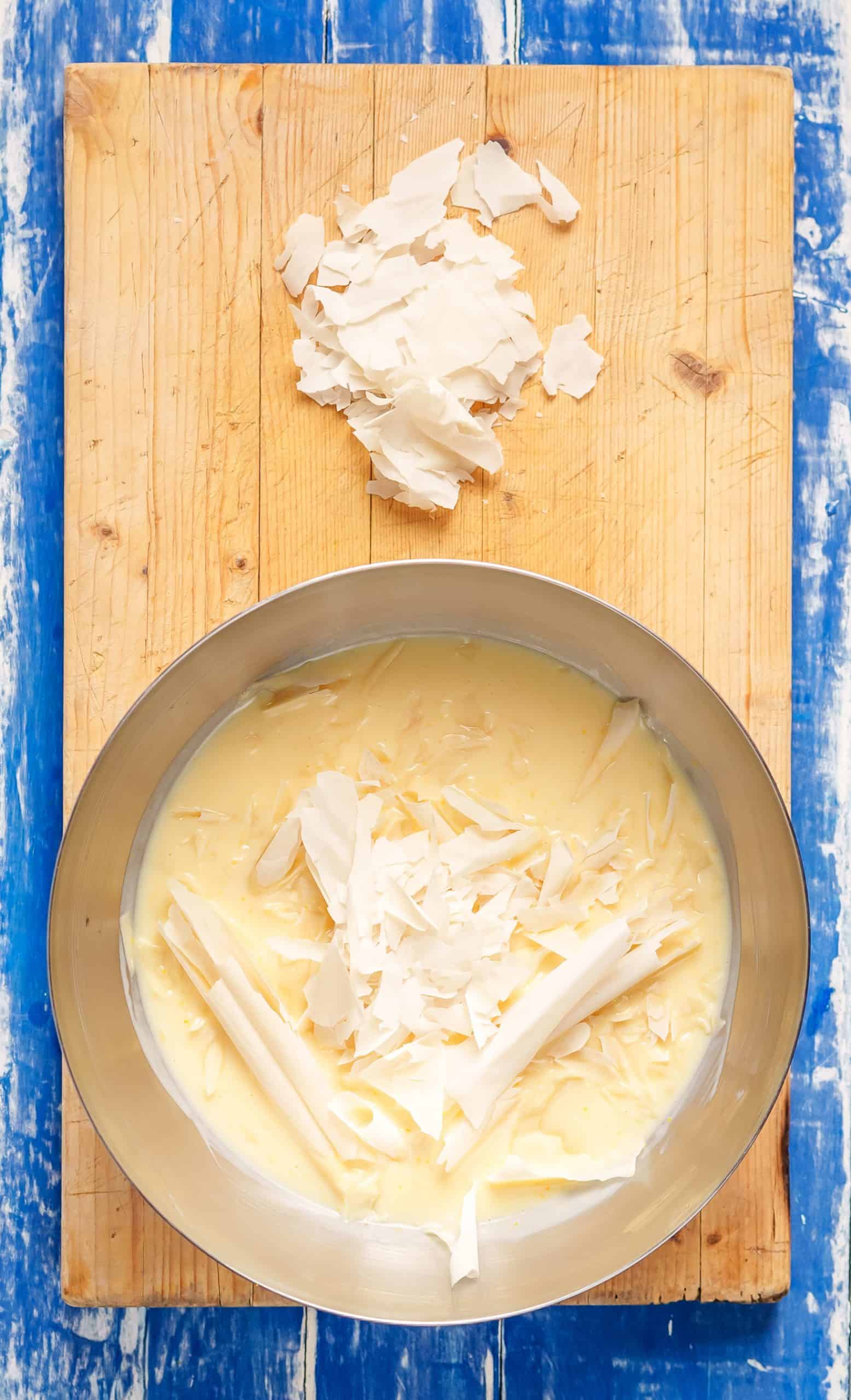
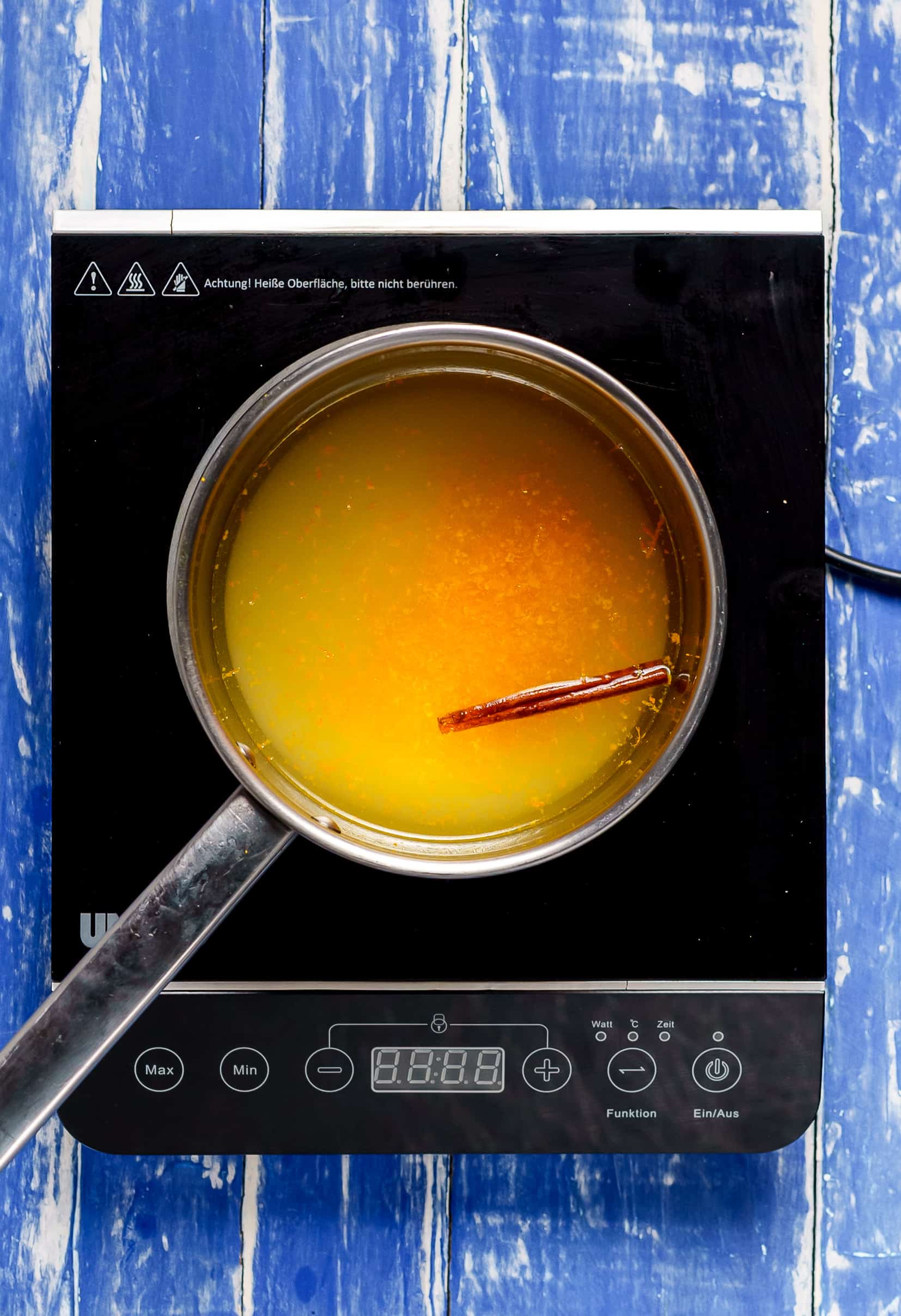
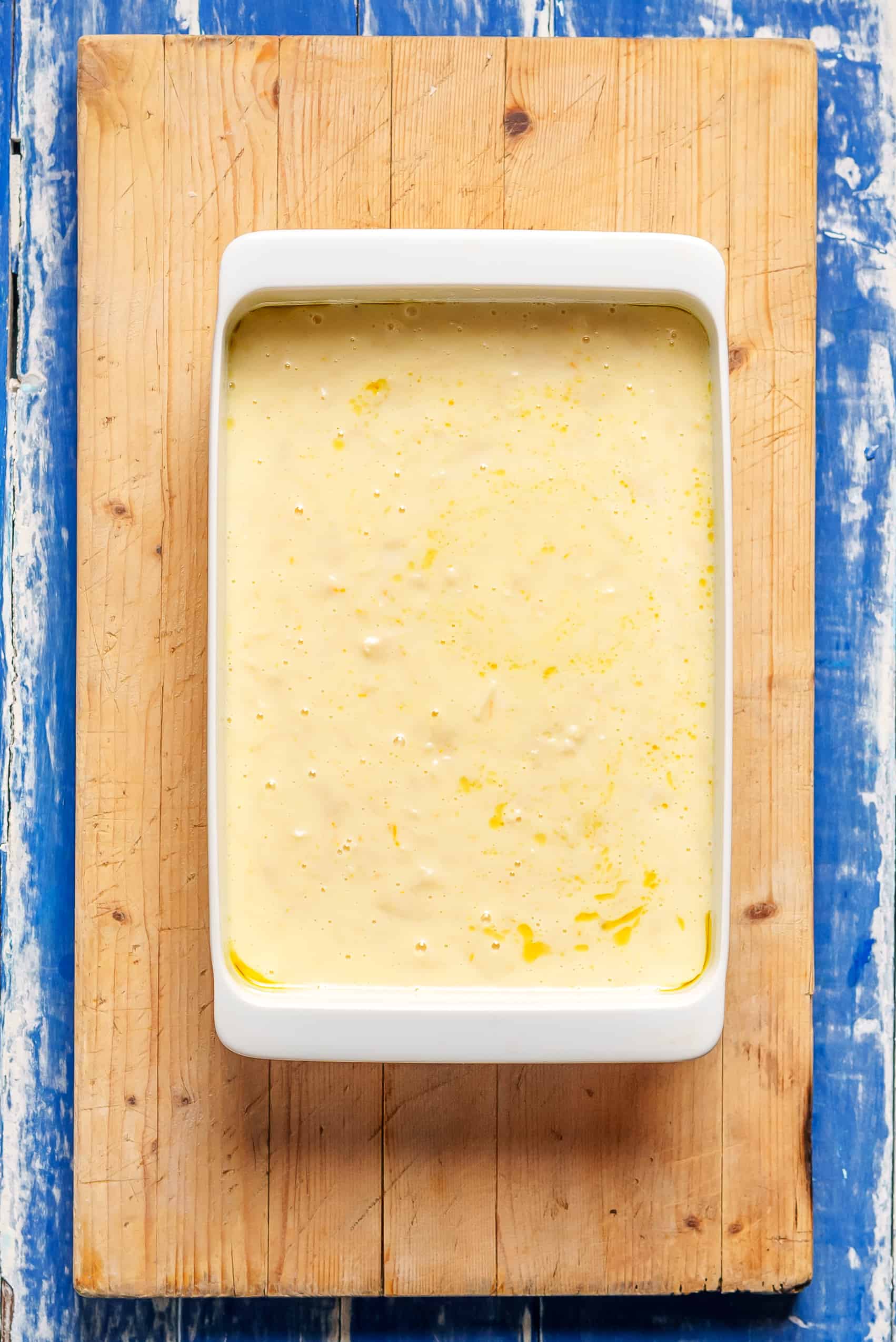
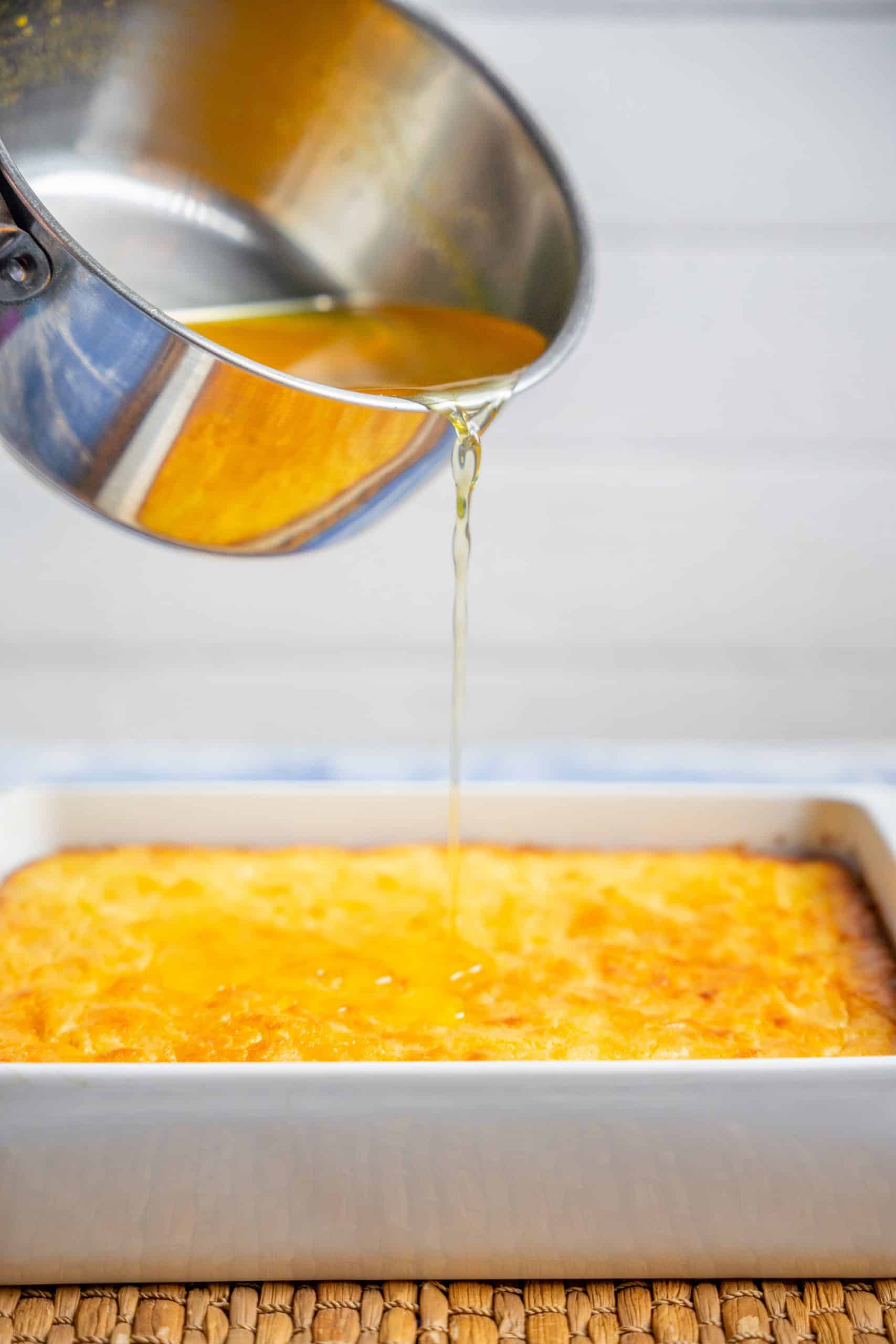
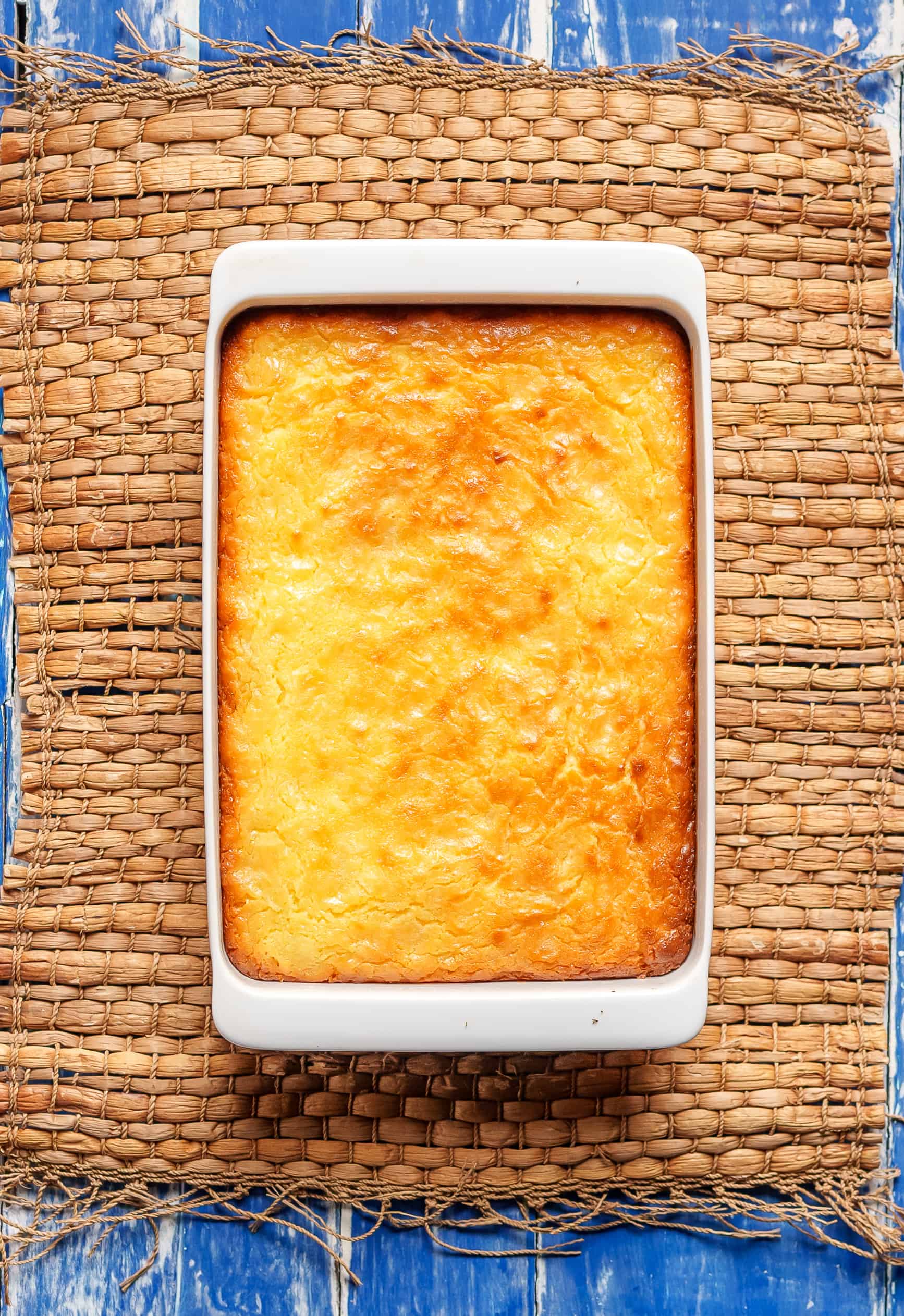
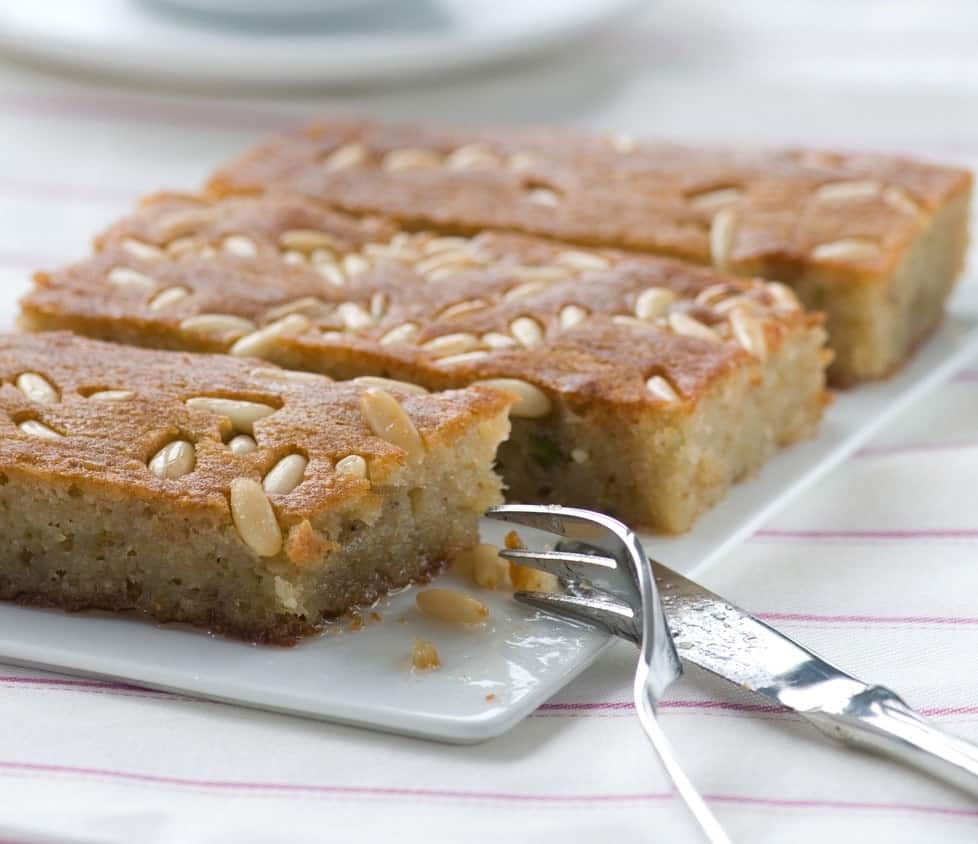
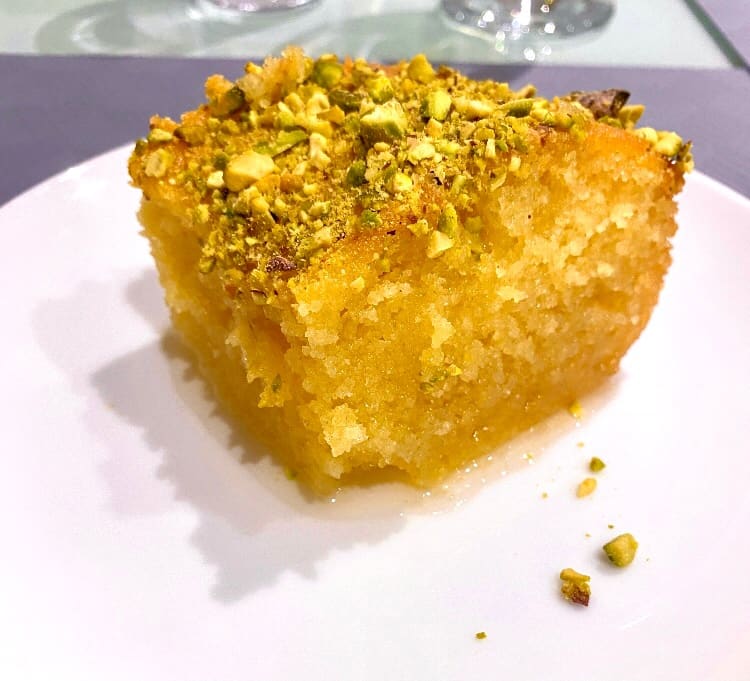
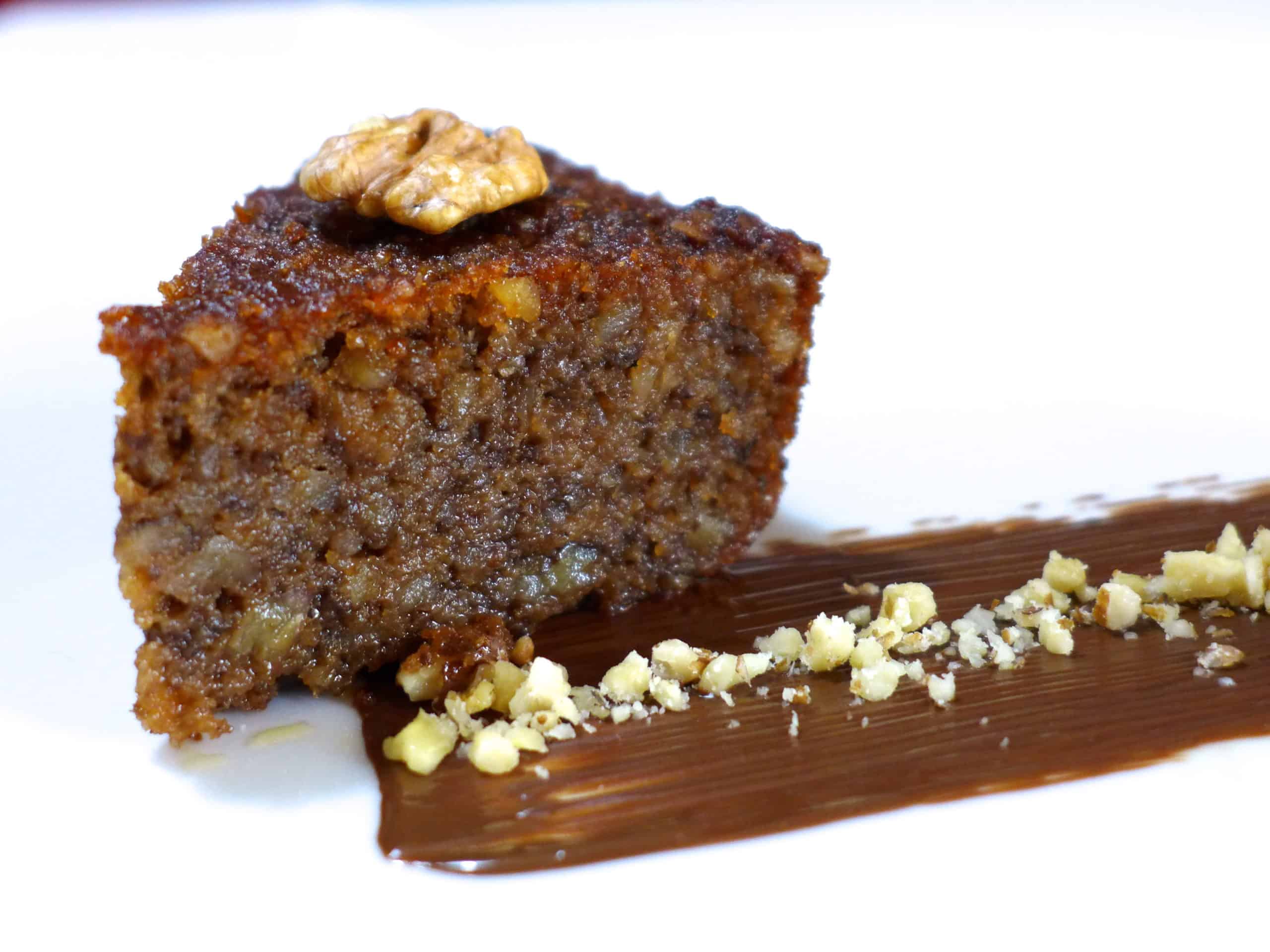
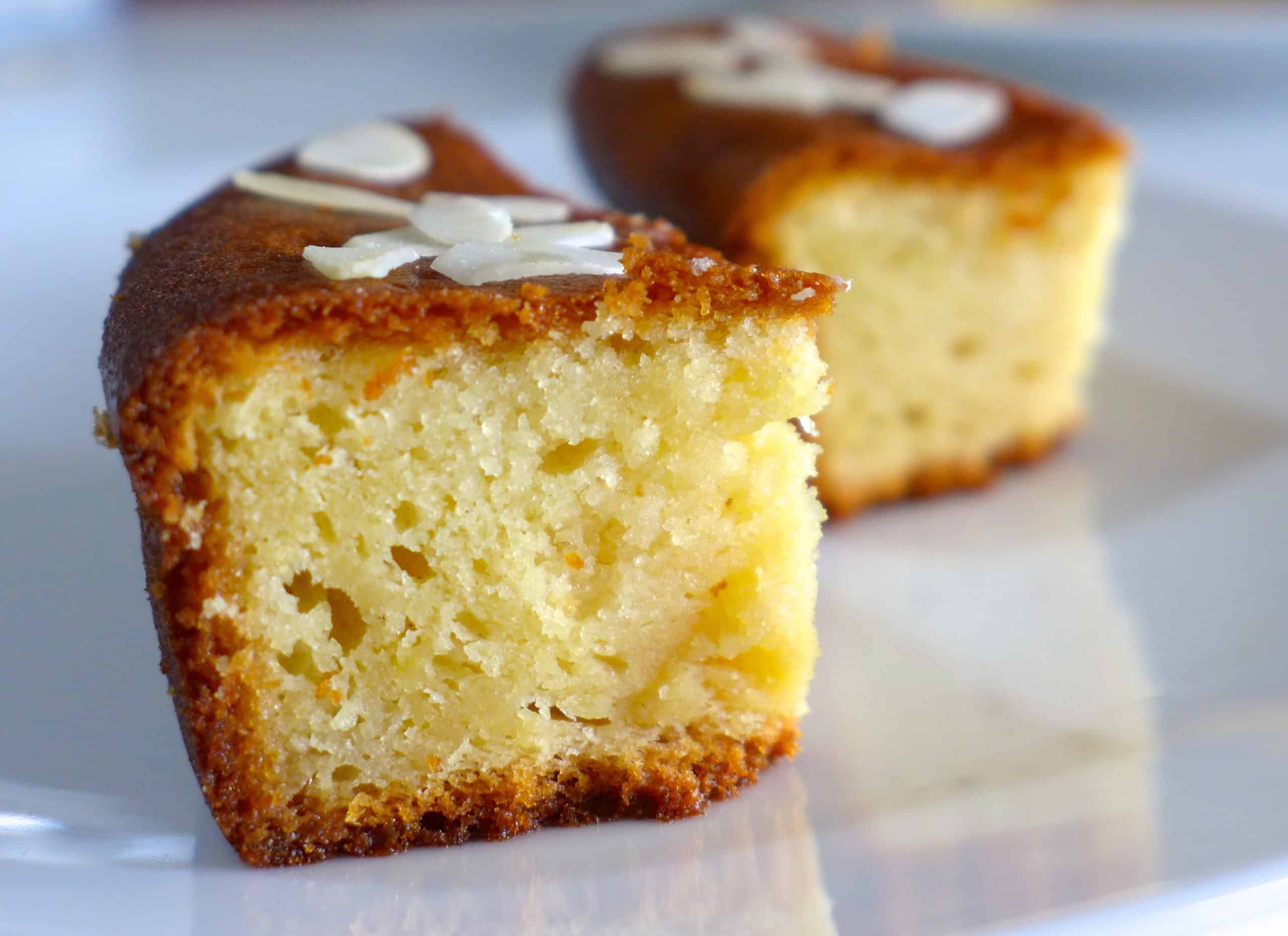

what is phyllo dough or a substitute ???
Also a recepy I want to try!
Last weekend we allready made the fluffy burger buns and the mosaiko… They were great!
Thanks for this lovely page :-*
I notice you use ml, grams and Celsius, so I am wondering about the size of the pan to use. Is that in inches? 20×30 inch pan?
Hi Roxanne, it was in centimetres, I’ve updated the recipe to clarify – approx.20x30cm / 8×12 inches. Thank you for your comment, great catch 🙂 🙂
Thanks Katerina, I made this (but used too large of a pan) They came out not as thick but just as good. Everyone loved it. I will make it again using the right size pan. Thank you!
Im so happy it turned out good for you 🙂 It really doesn’t matter if its a little thinner, its the soaking in syrup that does all the magic 🙂
Hi,
Can I use orange juice from a bottle?
I made the Vasilopita and the Karithopita over the holidays. Excellent!!! I love your recipes, very easy and traditional Greek dishes.
Hi Peggy, thank you very much for your kind words! Hope you find many more dishes that you enjoy!
Love Eli x
Can I use another kind of oil?
I made this today, tasted lovely but my middle sank. I only made a quarter of the recipe and adjusted the oven temperature as I have a fan assisted oven. Any ideas what may of happened to the middle ?
Thanks Jan (From the UK but living in Greece)
i love this i did it for a cool project and i got a 120 because it was sooooooo good
Thank you, i made this today, was very good.
This recipe was a disaster. I think the ratio of liquid to dry ingredients is wrong and the final batter is too watery / thin. Hence it never cooks properly and you end up with a cake which is burnt on the outside but half cooked in the middle. Sorry but it turned out to be a disappointment because this is one of my favourite things and I am still searching for a recipe that actually works
Can you tell me how long the cake will keep? How may days before a party can I make it?
Enjoyed this delicious cake in Crete and now I have the recipe ——-THANK YOU ! X
Hi there….I am a little concerned as other Portokalopita recipes use 3-5 eggs and this one doesn’t. Have you left the eggs out in error? Please advise.
can I use canola oil instead of corn oil?
Don’t make this recipe because it is not complete, he deceive the people,this recipe belong to my friend he is elenolebanes chef zozeif azzam he discovered it ,it need egged
IF YOU ARE LOOKING AT THE PICTURE OF THE SPONGE AND THINKING THAT IS THIS RECIPE YOU WILL BE DISSAPPOINTED IT IS NOT THE SAME RECIPE AS THE ORANGE SPONGE CAKE
One and 1/4 cup of oil seems a bit much in proportion to the rest of the ingredients! Is it correct? I want to be sure before I proceed. Thank you! Anna
Yes it is correct… Its needed for the phyllo to soak it up and cook properly…
Recipe for cake instructions call for pulp and zest however ingredients list call’s only for 2 oranges. So am I to zest the oranges then use the remaining whole oranges in the cake? Thanks for the clarification.
Yes that is right, zest the orange and use in the syrup and use the juice for the cake 🙂
Is this recipe correct as it does not list any eggs in the ingredients.
it is there, on the list of ingredients…
I have made this cake several times, using canola oil instead of corn oil. otherwise following all other ingredients and instructions. It turns out really well and is delicious. Thank you for sharing the recipe
Your welcome Judy! So glad you loved it!
My mouth is watering I cannot wait to try some of your recipes out. My first will be Avgolemono. Im not the biggest fan of soups. However, i believe I could devour Avgolemono on the daily.
I love avgolemono! I’m sure you’ll enjoy it, just make sure you follow the instructions so the eggs don’t curdle 🙂 Best of luck and let me know if I can help!
I used this recipe before and the eggs were not listed as an ingredient. Did anything else change besides eggs?
Hi Monica
We’ve added the eggs to make it a bit more fool proof when baking – nothing else has changed 🙂 Feel free to skip them if you want, but we got even better results with them in 🙂
Would 9X13 pan work?
I just made this amazing recipe. I made only half your recipe and I reduced the syrup sugar by half 100 grms and also the sugar in the mixture, by half. It tastes incredible really light, not too sweet, perfect recipe thank you so much x
I the last few times I made this, the cake is loses its texture….kind of soggy. It is not holding its texture. It is not to much syrup it’s the cake consistency- help
This recipe is a hit with me and my friends. I did make an adjustment and used part honey in the syrup. The cake tastes better a day or two after being in the fridge — if it lasts that long. Yum!
“it actually has no flour in it” Really? Phyllo *is* flour — and water and oil. (But the recipe looks delicious, regardless.)
We mean no raw flour 🙂 Of course it has in the form of phyllo 😉
I made this recipe today and it is delicious. I think it will be even better tomorrow. I made it according to the recipe and had no problems or issues at all.
Thank you!
is this recipe to be made in a 8x 12 “sheet pan or a pan with taller sides
Made this today and it came out perfectly. I didn’t have 4 medium eggs so I used 3 large eggs. The orange flavor is great without being over powering. I didn’t have any issues with it setting up or anything. Thank you for the great recipe!
I can’t wait to make this!!!
https://download-install.com/category/?page=1
Thanks for the recipe. I often find the top is burned and the inside still wet even with the cooking time extended. Do you have any suggestions for how I could avoid burning the top of the cake?
Can I freeze this? It makes such a large amount and don’t want to waste it!
As a non greek – I found this cake super easy to make and delicious.
As a non greek – I found this recipe easy to follow, and it turned out great.